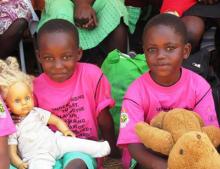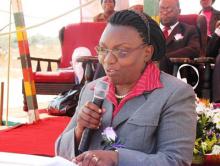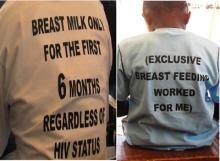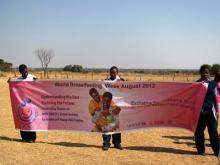World Breastfeeding week launched in Mhondoro
3 Aug. 2012, Mhondoro: World Breastfeeding week was launched in Mhondoro under the theme Understanding the past—Planning for the future. Celebrating 10 years of the Global Strategy for Infant and Young Child Feeding. The event, which was attended by the Mhondoro community, UN agencies, and other players in child health and nutrition, aimed to celebrate the successes and achievements of the past 10 years and to call for action to bridge the remaining gaps in policy and programmes on breastfeeding and infant and young child feeding. The launch comes amid calls by all stakeholders to improve the exclusive breastfeeding rates in Zimbabwe. Results from the National Nutrition Survey show that only 5.8% of babies below the age of 6 months are exclusively breastfed, and those that are not exclusively breastfed are being fed inadequate diets. Breastfeeding is, therefore, an intervention that needs a lot of support if Zimbabwe is to achieve the Millennium Development Goal of reducing child mortality to the target of 34 per 1 000 live births by 2015.
In a statement read on her behalf by Dr T. Kanyowa (NPO/CAH), WHO Repre-sentative, Dr Custodia Mandlhate, said that while the overall global rates of exclusive breastfeeding have risen only moderately since 1990, in some countries there have been marked increases achieved by a com-bination of actions guided by the global strategy for infant and young child feeding (GSIYCF.) which was adopted by WHO and UNICEF 10 years ago. “So we know that improvements in infant feeding are possible and we know how they can be achieved. Let us then make sure that effec-tive actions are implemented every-where,” she said. Dr Mandlhate also said member states further reinforced the global strategy at the 65th World Health Assembly earlier this year by endorsing a comprehensive implementation plan for maternal, infant, and young child nutrition. One of the targets of the plan is that at least 50% of babies un-der 6 months of age should be exclusively breastfed by 2025 against a current rate of 37%. The UNICEF Representative in a statement read on his behalf, al-so encouraged breastfeeding as a way of improving the nutritional status of children in Zimbabwe.
In his remarks, the Deputy Minister of Health and Child Welfare, Dr D. Mombeshora, urged everybody to play their part in protecting, promoting and support-ing actions that contribute towards improving exclusive breastfeeding rates in Zimbabwe. He also said the Government of Zimbabwe has already responded to the theme’s call to understand what has happened in the past 10 years and why through several studies that have been done. Studies have been conducted to understand the reasons for the high stunting rates (32%)and the barriers and facilitators of optimal infant and young child feeding practices. These stud-ies have shown that the influence of grandmothers, fathers and other family members (in laws) in feed-ing decisions and practices has a great impact on in-fant and young child feeding. “We now understand the reasons why mothers are not optimally feeding their infants, and in response, the Ministry of Health and Child Welfare has committed itself to finalise the Policy and Strategy on infant and young child feeding and develop a National Behaviour Change Communi-cation Strategy to address these negative infant and young child feeding practices and perceptions in the community,” said Dr Mombeshora.
World Breastfeeding Week is commemorated annual-ly during the first week of August where countries join together to celebrate, protect, support and promote breastfeeding.
For more information contact: juliasw [at] zw.afro.who.int










